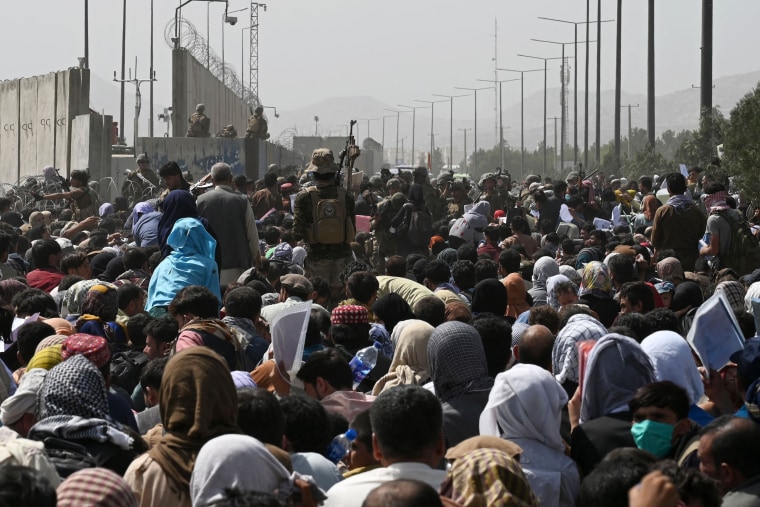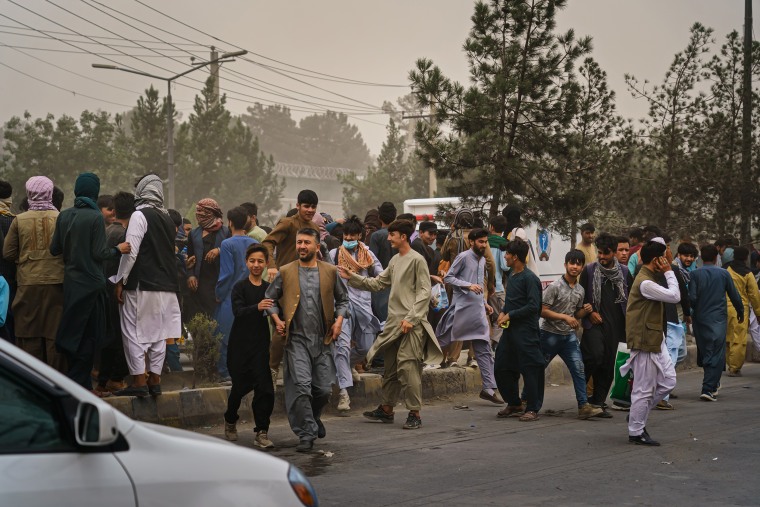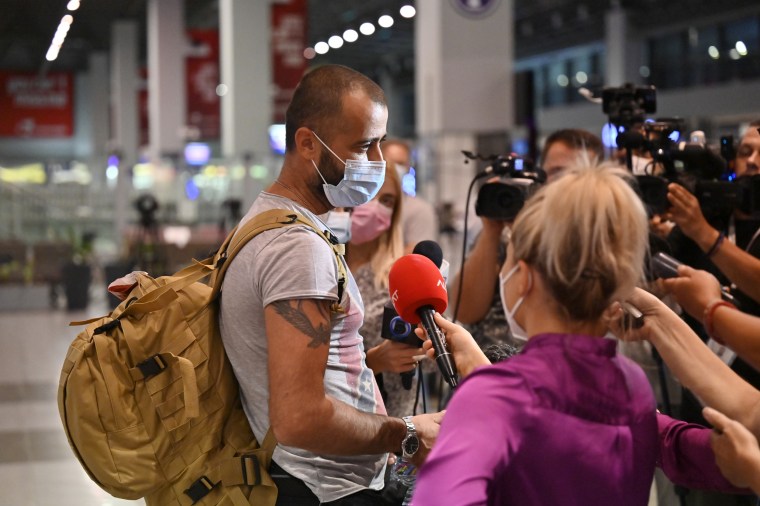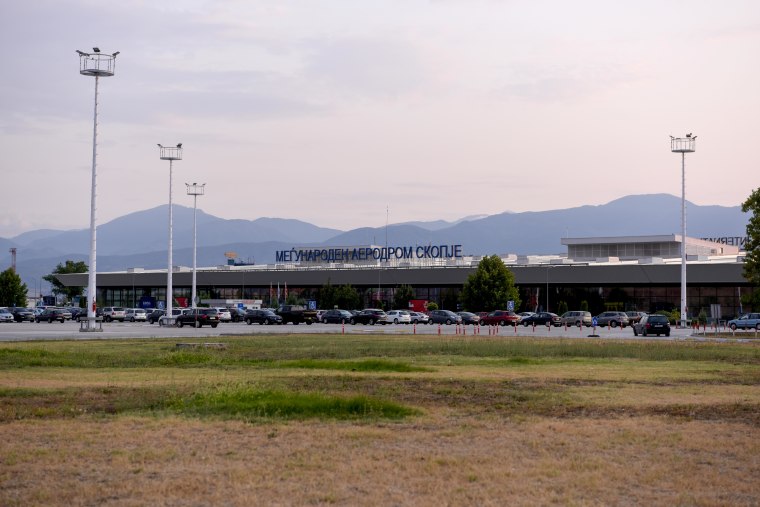SKOPJE, North Macedonia — Three Balkan countries have offered to help desperate Afghans, but no refugees have flown in on U.S. flights.
As thousands of people continue to throng around Hamid Karzai International Airport in Kabul, officials in North Macedonia, Kosovo and Albania — neighboring Balkan countries whose populations have experienced violence themselves — said last week that they had offered to temporarily take in those fleeing Afghanistan.
But a week after the Taliban completed their lightning-fast takeover of the country, finally walking into Kabul last Sunday without firing a shot, no refugees have arrived on U.S. flights, officials in the countries said. They did not know when the Afghans would arrive.
Duško Arsovski, a spokesman for the government of North Macedonia, said Saturday that the country was waiting for information and was organizing hotels for the refugees to stay in.

Prime Minister Zoran Zaev said Friday that his tiny country would take in around 650 Afghans.
“We are rescuing a peaceful population who have cherished democracy for 20 years and who were a help and support to our military on their missions over there,” he said.
A spokesman for Kosovo’s government said a flight could be expected in coming days, although he had no information about when it would arrive and could not say how many Afghans the country would take in.
The situation was equally unclear in Albania, where the prime minister’s spokesman, Endri Fuga, said, “If they arrive today, we still don't know.”
The State Department and the Defense Department did not comment when asked why flights had not been sent to those countries, even though thousands are hoping for flights out of Afghanistan.
In Kabul, the U.S. faces a logistical nightmare getting U.S. citizens and Afghan refugees out of the city after thousands of terrified people raced to the airport desperate to leave as the Taliban consolidated control.
The U.K. government said Sunday that seven people died after they were crushed in the crowds around the airport.
Download the NBC News app for breaking news and politics
Two U.S. defense officials said Saturday that the U.S. was tracking specific threats from the Islamic State, the terrorist group better known as ISIS, against Kabul's airport and against Americans and others trying to leave the country. The military is working on alternative ways to get Americans, Afghans and third-country nationals safely to the airport.
“We are executing an alternate path,” a defense official said.
Earlier, the U.S. Embassy in Afghanistan advised U.S. citizens against traveling to the airport because of “potential security threats.”
About 22,000 people have been evacuated from Afghanistan since operations began in late July, with 17,000 having been evacuated over the past week, Army Maj. Gen. William Taylor, deputy director for regional operations for the Joint Chiefs of Staff, told reporters Saturday. In the previous 24 hours, 3,800 people were evacuated from Kabul, he said.
President Joe Biden has pledged that the U.S. will do all it can to provide safe evacuations for Afghan civilians, many of whom helped U.S. forces and now might be targeted because of their association with the U.S.

But time is running out ahead of his Aug. 31 deadline to withdraw most remaining U.S. troops, and he has not committed to extending it.
State Department spokesman Ned Price said Friday that the U.S. was trying to transfer people through countries in the region, like Qatar, in part for fuel efficiency. From there, Americans can take commercial or State Department charter flights home, he said.
The Pentagon said Sunday that it would draft commercial aircraft to help transport people once they have been evacuated.
Meanwhile, in southern Europe, Albania, Kosovo and North Macedonia — the newest member of NATO — remain eager to help their U.S. ally.
“The governments of North Macedonia, Albania and Kosovo are eager to show their strategic alliance with the U.S.,” said Petar Arsovski, a Macedonian political consultant. “And maybe send a message to the E.U. that they’re not without options.”
The three countries are hemmed in by European Union member states but are not part of the political and economic group.
Arsovski said the region was trying to curry favor with the White House. North Macedonia wants the Biden administration to lean on Bulgaria to unblock its accession process to the E.U., Kosovo hopes Washington will help it build a more productive dialogue with Serbia, and Albania wants to start negotiations to join the E.U., he said.
At an otherwise-quiet Skopje airport Friday night, reporters greeted a flight of Macedonians who had been working for military contractors in Kabul. As families welcomed their loved ones teary-eyed with relief under fluorescent airport lights, several people expressed concern for Afghan civilians left behind.
“Those people really need help,” said Jusuf Mustafi, 36, who said he had been working as a military contractor on and off in Afghanistan for 3½ years. “Everyone should help every human.”

Mustafi said his country was right to have offered to take in refugees, saying some Macedonians knew what it meant to be uprooted by violence, as they were forced to flee during clashes in 2001 that shook this Balkan country.
The sentiment was echoed on the wide thoroughfares of central Skopje, which boast imposing monuments and is surrounded by picturesque hills.
“When the war happened here, I was a refugee,” said Deti Saiti, 49, a shop assistant in an Albanian neighborhood of the city near the banks of the River Vardar. “Nobody wants to leave their homes. They're forced to, so of course we will welcome them.”
But not everyone was so welcoming. Some passersby said North Macedonia was poor and could not cope with more dependents.
“They should go to America. It's a wealthy nation,” said Ivanka Miteva, 74.
Welcome or not, so far no Afghan refugee has made it to the Balkans to find out.
